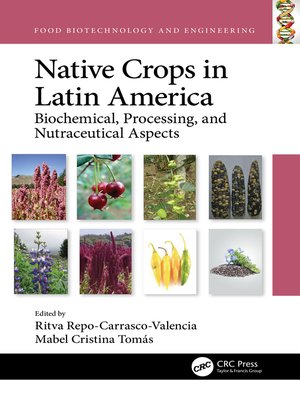Native Crops in Latin America
ebook ∣ Biochemical, Processing, and Nutraceutical Aspects · Food Biotechnology and Engineering
By Ritva Repo-Carrasco-Valencia

Sign up to save your library
With an OverDrive account, you can save your favorite libraries for at-a-glance information about availability. Find out more about OverDrive accounts.
Find this title in Libby, the library reading app by OverDrive.



Search for a digital library with this title
Title found at these libraries:
| Library Name | Distance |
|---|---|
| Loading... |
Functional foods improve health and can reduce the risk of different diseases. In this sense, a variety of bioactive compounds present in functional foods are able to modulate inflammatory responses or exhibit interesting bioactivities such as antihypertensive, antioxidants, anticancer, antimicrobials, anticariogenics, among others.
There is a revalorization and mounting characterization on ancient grain crops of Latin America such as chia, amaranth, quinoa, Andean lupin, sacha inchi. This area also posseses a huge variety of native fruits such as camu camu, goldenberry, lucuma, which have health-promoting compounds. Native Crops in Latin America: Biochemical, Processing, and Nutraceutical Aspects explores recent investigations related to the potential use of the native crops as sources of bioactive compounds (proteins, hydrolysates, peptides, antioxidants, essential lipids, dietary fiber, pre- and probiotics) and as ingredients in functional foods.
Key Features:
This book contains recent findings impacting research in subjects such as cardiovascular and gastrointestinal systems, gut microbiota, delivery systems, product development, and gastronomy. Such information on Latin American crops may significantly influence the well-being, health, and nutrition of consumers. This will be a useful resource for food scientists, food technologists, nutritionists, ingredient manufacturers, and health care professionals, and relevent knowledge for any University's Food Science department.
Also available in the Food Biotechnology and Engineering series:
Volatile Compounds Formation in Specialty Beverages, edited by Felipe Richter Reis and Caroline Mongruel Eleutério dos Santos (ISBN: 9780367631901)
For a complete list of books in this series, please visit our website at: https://www.routledge.com/Food-Biotechnology-and-Engineering/book-series/CRCFOOBIOENG







